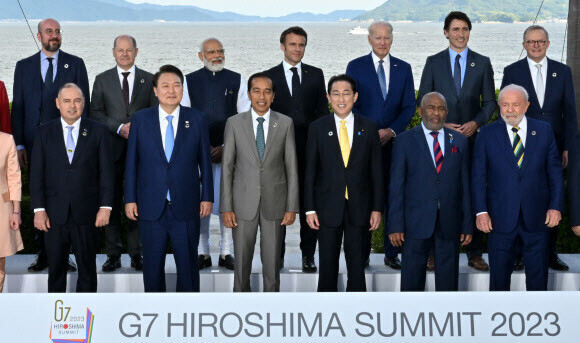hankyoreh
Links to other country sites 다른 나라 사이트 링크
End of era of globalization signals end of S. Korea’s export-led growth, says report

According to a new report, 50 years of continuing globalization were brought to a close by the 2008 global financial crisis, drawing the curtain on export-led growth in South Korea.
According to a report titled “The End of the Second Period of Globalization and the Korean Economy” that was published by the Korea Institute for Industrial Economics and Trade (KIET) on Thursday, trade as a share of global GDP has been growing at a slower rate since the global financial crisis of 2008.
The report said that global trade had grown by a yearly average of 7% in 1990-2007, prior to the global financial crisis. But over the past 10 years, the average rate of growth has fallen to half that, around 3.1%. Furthermore, foreign direct investment as a percentage of global GDP (a metric closely related to trade) stopped increasing after the global financial crisis and is now trending downward.
The report defined the continuing rise of the worldwide trade-to-GDP ratio as being the expansion of globalization. The global economy passed through the first period of globalization after the Industrial Revolution (the late 19th century to World War I) and the second period of globalization after World War II (and the adoption of the Bretton Woods system).
“The second period of globalization expanded even further during and after the 1980s because of the participation of developing countries and the end of the Cold War, but that expansion stopped after the global financial crisis of 2008 and has been stagnating or declining over the past decade or so,” the report said.
Korea’s export growth rate has fallen even further during the same period. Korea reported an export growth rate of 13.2% between 1990 and 2007, more than double the economic growth rate during the same period, but that growth rate fell to 2.4% over the past 10 years, a little below the economic growth rate. Excluding a short-term boost in exports during the pandemic, the average export growth rate over the past 10 years has been at least 1 point lower than the economic growth rate, the report found.
“The downturn in exports has had a particularly strong impact on the manufacturing sector, reversing the relationship between manufacturing growth and economic growth over the past decade. When the export growth rate is lower than the economic growth rate, it becomes impossible to say that Korea is experiencing export-led growth,” the report said.
“The ‘new Washington consensus’ endorsed in the recent G7 summit stakes out a position that is the exact opposite of the Washington consensus of the 1990s, which drove globalization by prioritizing free trade. The new consensus basically sounds the death knell for globalization,” said Kang Du-yong, a senior analyst at the KIET.
Kang predicted that the slump in trade and the economy will accelerate if the US-China conflict leads to their decoupling in the global economy. The shock would be especially severe in Korea, being a major exporter of intermediate goods and a major trading partner with both the US and China.
An analysis by the International Monetary Fund and the World Trade Organization estimates that full-fledged decoupling would cause global GDP to fall by as much as 7%. In the group of countries that are particularly vulnerable to such a change, including exporters, the drop in GDP could be as high as 12%.
“Given Korea’s global competitiveness in high-tech industries, we need to make a greater effort to work with other countries that share our interests to prevent the trade environment from deteriorating. And since exports will probably be contributing less and less to growth, we need to foster drivers of growth in the domestic economy including consumption and investment,” Kang said.
By Kim Hoe-seung, senior staff writer
Please direct questions or comments to [english@hani.co.kr]

Editorial・opinion
![[Editorial] Intensifying US-China rivalry means Seoul must address uncertainty with Beijing sooner than later [Editorial] Intensifying US-China rivalry means Seoul must address uncertainty with Beijing sooner than later](https://flexible.img.hani.co.kr/flexible/normal/500/300/imgdb/original/2024/0517/8117159322045222.jpg) [Editorial] Intensifying US-China rivalry means Seoul must address uncertainty with Beijing sooner than later
[Editorial] Intensifying US-China rivalry means Seoul must address uncertainty with Beijing sooner than later![[Column] When ‘fairness’ means hate and violence [Column] When ‘fairness’ means hate and violence](https://flexible.img.hani.co.kr/flexible/normal/500/300/imgdb/original/2024/0516/7417158465908824.jpg) [Column] When ‘fairness’ means hate and violence
[Column] When ‘fairness’ means hate and violence- [Editorial] Yoon must stop abusing authority to shield himself from investigation
- [Column] US troop withdrawal from Korea could be the Acheson Line all over
- [Column] How to win back readers who’ve turned to YouTube for news
- [Column] Welcome to the president’s pity party
- [Editorial] Korea must respond firmly to Japan’s attempt to usurp Line
- [Editorial] Transfers of prosecutors investigating Korea’s first lady send chilling message
- [Column] Will Seoul’s ties with Moscow really recover on their own?
- [Column] Samsung’s ‘lost decade’ and Lee Jae-yong’s mismatched chopsticks
Most viewed articles
- 1For new generation of Chinese artists, discontent is disobedience
- 2[Editorial] Transfers of prosecutors investigating Korea’s first lady send chilling message
- 3[Exclusive] Unearthed memo suggests Gwangju Uprising missing may have been cremated
- 4[Editorial] Intensifying US-China rivalry means Seoul must address uncertainty with Beijing sooner t
- 5S. Korea “monitoring developments” after report of secret Chinese police station in Seoul
- 6N. Korean media upgrades epithet for leader’s daughter from “beloved” to “respected”
- 7Yoon says concern about biased diplomacy is being incited by “communist totalitarian forces”
- 8[Column] US troop withdrawal from Korea could be the Acheson Line all over
- 9Xi, Putin ‘oppose acts of military intimidation’ against N. Korea by US in joint statement
- 1060% of young Koreans see no need to have kids after marriage